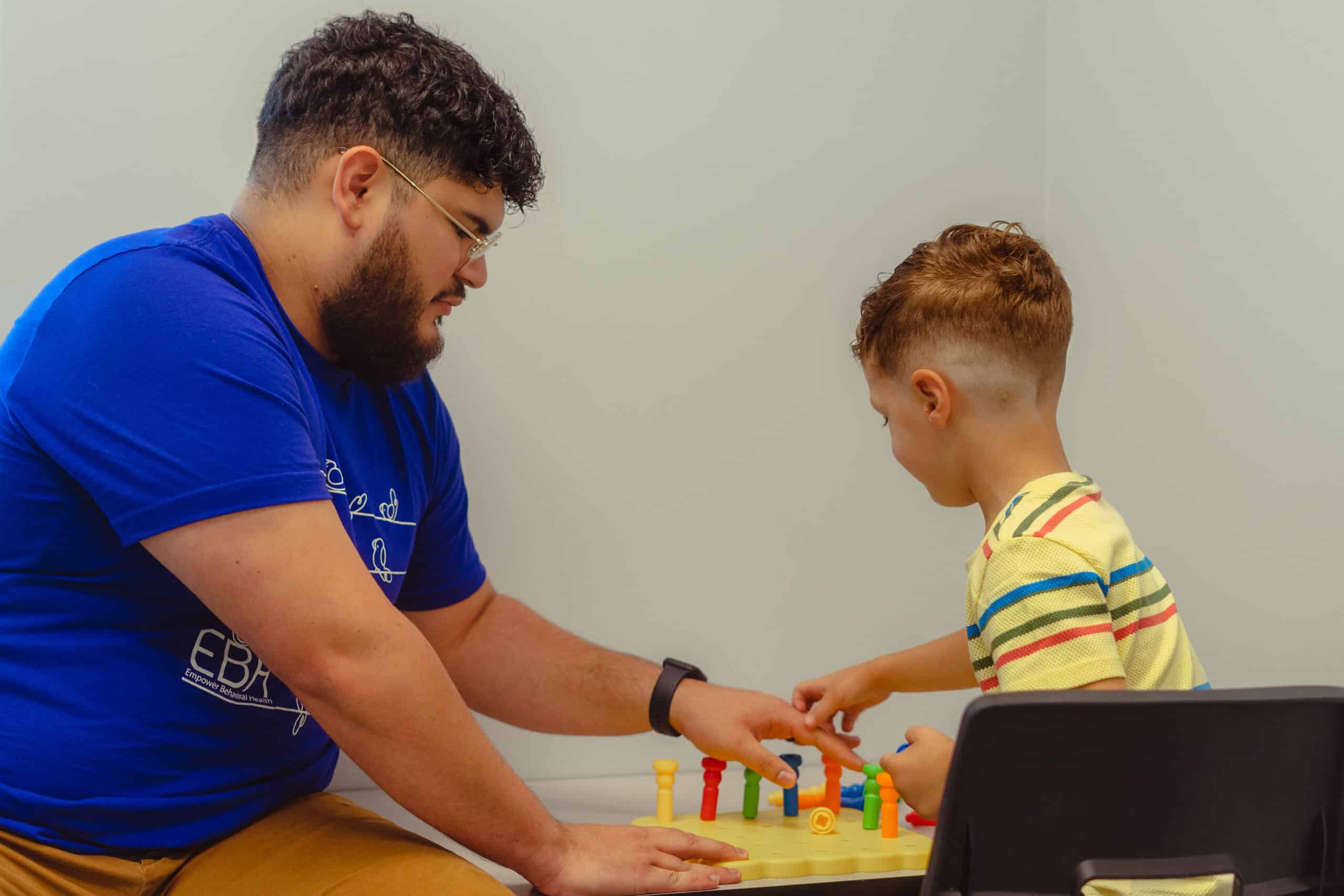
Part-Time Focused Intervention
What is Focused ABA Therapy?
Focused ABA therapy is a type of behavior therapy used to treat children with ASD and other developmental disabilities. Rather than a fully comprehensive ABA program, focused ABA therapy is meant to help with a limited set of key behavioral targets. Our part-time services typically range between 15-25 hours per week. Treatment recommendations depend on each child’s unique needs and will be discussed with you at the time of their ABA assessment.
What is the Goal of Focused ABA Therapy?
The goals of focused ABA therapy are similar to those of a full-time program. These goals include improved communication, social skills, and behavior reduction of non-functional skills. Although a full-time program can allow for the development of these key skills, treatment can be more in-depth and specific in a focused program.
Focused ABA therapy can also help with specific behavioral issues. For example, an individual who throws objects when upset will learn how to reduce this form of aggression.

Part-Time Focused Intervention
Our Focused ABA Therapy Strategies
Our dedicated BCBAs utilize a variety of evidence-based positive reinforcement strategies during sessions. At Empower Behavioral Health, our strategies are personalized to fit the needs of the individual and the goals established during the intake process. BCBAs will collaborate with caregivers to determine which strategies are the most effective.
Task Analysis
Task analysis is a type of behavior intervention that involves breaking down a task into small, manageable steps. It is often used in ABA therapy to teach new skills to individuals with autism. The BCBA will create a task analysis chart that outlines all of the steps involved in completing the task, then teach each step of the task using prompting strategies and positive reinforcement.
Task analysis can be used to teach a wide variety of skills, from simple tasks like brushing teeth to more complex tasks like completing a puzzle.
Prompting and Fading
Prompting and fading refers to the process of gradually reducing the number of prompts that are provided to a child during ABA sessions. For example, a child may initially be prompted to complete a task every time they are asked. Over time, the BCBA will provide fewer prompts, until the child is able to complete the task independently.
Prompt fading is an important part of ABA therapy because it helps children learn how to generalize the skills they are learning in therapy to new situations and environments.
Premack Principle
The Premack principle, also known as “First/Then”, is a common strategy used in ABA therapy. It states that more preferred activities can be used to reinforce less preferred activities. For example, a child who enjoys playing with toys may be more likely to engage in a less preferred activity, such as completing a puzzle, if they know that they will get to play with their toys afterwards.
The Premack principle is an effective way to increase the frequency of desired behaviors while simultaneously decreasing the frequency of undesired behaviors. When used correctly, it can be an effective tool in the treatment of ASD.
Video Modeling
Video modeling in ABA therapy is a process where an individual with autism watches a video of someone else engaging in the desired behavior. The idea behind video modeling is that a child can learn new behaviors by observing them being performed by another individual. This type of therapy is particularly effective for individuals with autism, as they may have difficulty learning new skills from verbal instructions alone.
Other ABA therapy strategies we use include functional communication training, token economy, discrete trial training, and natural environment training.

Part-Time Focused Intervention
What to Expect During our Focused Intervention Program
During our focused ABA therapy program, patients can expect to learn a key set of functional skills. Our program is individualized and treatment plans are developed based on the specific needs of your child. Utilizing a variety of positive reinforcement strategies, we’re able to help individuals establish long-term behavior changes.
Our sessions are driven by the individual’s motivation to help guide the sessions. ABA therapy should be an enjoyable experience for our patients. Although rewards are sometimes given as a part of our positive reinforcement strategy, we do not utilize bribery to achieve desired behaviors.
Outside of skill development, we also empower individuals with autism to be self-advocates. We don’t attempt to make our patients appear “less autistic”. We want our patients to feel confident despite their disability, and speak up when they need something.
Part-Time Focused Intervention Program FAQs
Is this program only for children?
No. Our part-time focused ABA program is available for individuals of all ages. Unlike many other ABA providers, we don’t have an age cap for any of our ABA therapy services.
Is an official autism diagnosis required to enroll in the part-time program?
No. We do not require an autism diagnosis to utilize our ABA services, but it is a requirement for insurance coverage. Empower Behavioral Health is in-network with a majority of private insurance providers.
How will I be involved in my child’s autism treatment?
Caregiver involvement is an important part of our ABA therapy program and your child’s progress. We require caregivers to attend monthly sessions to reinforce what is learned in ABA across different settings and people.
I’m skeptical of ABA therapy due to things I’ve seen online, how is Empower Behavioral Health different?
There’s a lot of misconception online about ABA therapy techniques, but we can assure you that we do not utilize coercive techniques or abuse in any of our programs. We also do not utilize any form of punishment unless a behavior is extremely harmful to the child or others such as eye-gouging, or running into a street with moving cars.
The goal of our ABA therapy program is to reinforce positive behavior through evidence-based strategies suited to your child’s age and needs.
Do you work with individuals with aggression and severe behavior?
We work with patients who exhibit aggression and severe behavior when clinically appropriate. To ensure the safety of our staff, the individual, and others we want to ensure our staff is trained to support the patient’s specific needs. If we determine we’re not the right fit, our intake team will provide you a referral to a more appropriate provider in your area.





